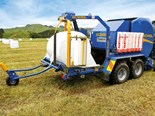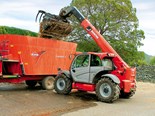Farmers advised to prepare feed budgets
As stock feed becomes scarce Federated Farmers is encouraging farmers to get a feed plan and budget under way for the remainder of the year.
"The dry conditions and reduced payout have left many farmers not only short of feed now, but facing a shortage for the rest of the year," says Federated Farmers adverse events spokesperson Katie Milne.
"Farmers may have already done this, but given this is a pretty stressful time we want to remind them to keep it up to date."
"If farmers can see that there will be some problems, they need to talk to their farm consultant, accountant and banker as early as possible so that they are best placed to help work through the issues. They may have financial tools available to help that you didn't know about."
"Farmers using Palm Kernel Expeller should decide how much they need and get their contract signed with their supplier to ensure that it is available when it is needed."
"When doing a feed budget in times of drought, or other periods when feed supplies are tight, farmers should remember that other issues can arise that need to be well managed to avoid potential problems, such as stock transitioning to a new feed, stock not meeting target weights and massive surge in worm burden when the rain does come, especially for calves and lambs."
"In particular transition periods for stock on to fodder beet crops. At any time of year if stock are changing from one diet to another, farmers know it cannot be done instantly, but has to be done gradually over time frames of up to a month to avoid animal health issues."
"Farmers should also look at what other feed sources are available to them by speaking to their usual feed supplier, farm advisor or farm service company and not forgetting to manage any risks in the transition process. Federated Farmers has set up its own Feed Line/Feed List where farmers can look to find feed available or list theirs to sell."
"Any feed budget that is developed also needs to be reviewed at suitable intervals so that it can remain useful as and when circumstances change."
Katie concluded by reminding farmers of the Rural Support Trust service if they are not coping and advising farmers on ways to farm through until next spring without compromising animal welfare:
- Doing your feed budget – Know how much and what type of feed you need (destock if necessary).
- Securing your finances – Make sure you have the finance to purchase it.
- Securing your supply – Make sure you have the feed guaranteed for delivery.
- Contracting feed now – Get it before the prices go up any further if possible.
Keep up to date in the industry by signing up to Farm Trader's free newsletter or liking us on Facebook


.jpg)
.jpg)
.jpg)
.jpg)
.jpg)
.jpg)
.jpg)
.jpg)
.jpg)



